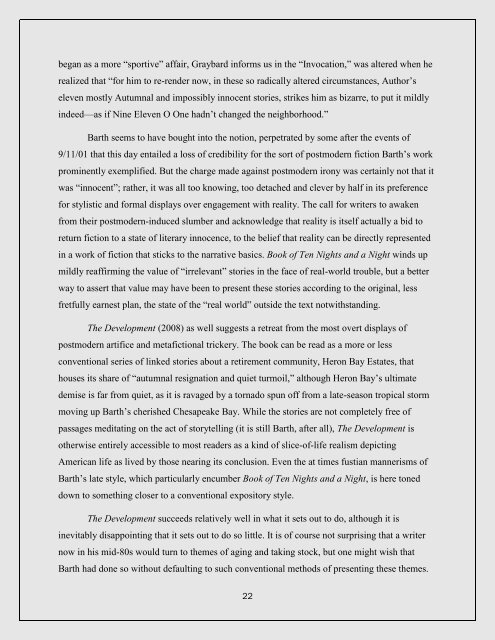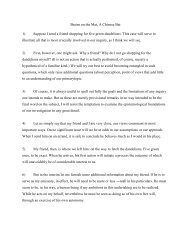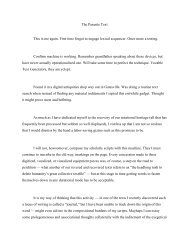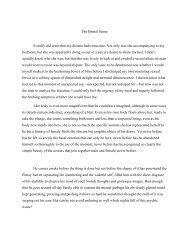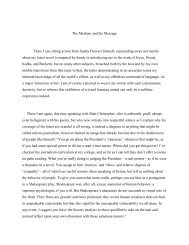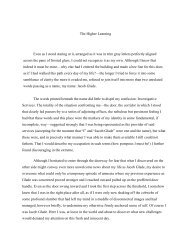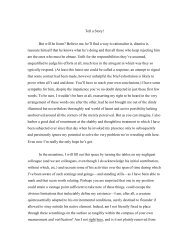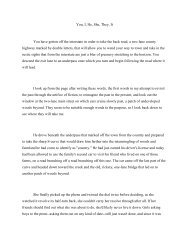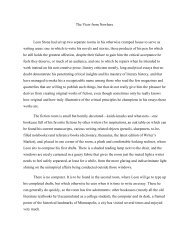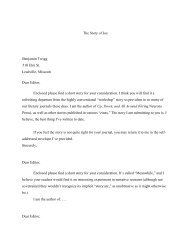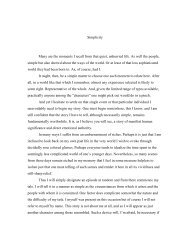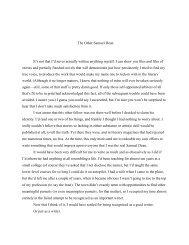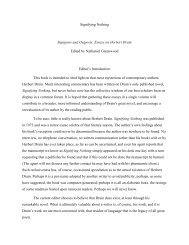APF
You also want an ePaper? Increase the reach of your titles
YUMPU automatically turns print PDFs into web optimized ePapers that Google loves.
egan as a more “sportive” affair, Graybard informs us in the “Invocation,” was altered when he<br />
realized that “for him to re-render now, in these so radically altered circumstances, Author’s<br />
eleven mostly Autumnal and impossibly innocent stories, strikes him as bizarre, to put it mildly<br />
indeed—as if Nine Eleven O One hadn’t changed the neighborhood.”<br />
Barth seems to have bought into the notion, perpetrated by some after the events of<br />
9/11/01 that this day entailed a loss of credibility for the sort of postmodern fiction Barth’s work<br />
prominently exemplified. But the charge made against postmodern irony was certainly not that it<br />
was “innocent”; rather, it was all too knowing, too detached and clever by half in its preference<br />
for stylistic and formal displays over engagement with reality. The call for writers to awaken<br />
from their postmodern-induced slumber and acknowledge that reality is itself actually a bid to<br />
return fiction to a state of literary innocence, to the belief that reality can be directly represented<br />
in a work of fiction that sticks to the narrative basics. Book of Ten Nights and a Night winds up<br />
mildly reaffirming the value of “irrelevant” stories in the face of real-world trouble, but a better<br />
way to assert that value may have been to present these stories according to the original, less<br />
fretfully earnest plan, the state of the “real world” outside the text notwithstanding.<br />
The Development (2008) as well suggests a retreat from the most overt displays of<br />
postmodern artifice and metafictional trickery. The book can be read as a more or less<br />
conventional series of linked stories about a retirement community, Heron Bay Estates, that<br />
houses its share of “autumnal resignation and quiet turmoil,” although Heron Bay’s ultimate<br />
demise is far from quiet, as it is ravaged by a tornado spun off from a late-season tropical storm<br />
moving up Barth’s cherished Chesapeake Bay. While the stories are not completely free of<br />
passages meditating on the act of storytelling (it is still Barth, after all), The Development is<br />
otherwise entirely accessible to most readers as a kind of slice-of-life realism depicting<br />
American life as lived by those nearing its conclusion. Even the at times fustian mannerisms of<br />
Barth’s late style, which particularly encumber Book of Ten Nights and a Night, is here toned<br />
down to something closer to a conventional expository style.<br />
The Development succeeds relatively well in what it sets out to do, although it is<br />
inevitably disappointing that it sets out to do so little. It is of course not surprising that a writer<br />
now in his mid-80s would turn to themes of aging and taking stock, but one might wish that<br />
Barth had done so without defaulting to such conventional methods of presenting these themes.<br />
22


